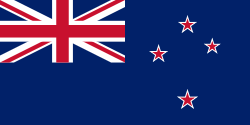| New Zealand at the 1960 Winter Olympics | |
|---|---|
 | |
| IOC code | NZL (NZE used at these Games) |
| NOC | New Zealand Olympic Committee |
| Website | www |
| in Squaw Valley | |
| Competitors | 4 (2 men, 2 women) in 1 sport |
| Flag bearer | Bill Hunt |
| Medals |
|
| Winter Olympics appearances (overview) | |
New Zealand competed at the 1960 Winter Olympics in Squaw Valley, United States. The country was represented by its Alpine skiing team of Bill Hunt, Cecelia Womersley, Patricia Prain, and Sam Chaffey. No medals were earned.